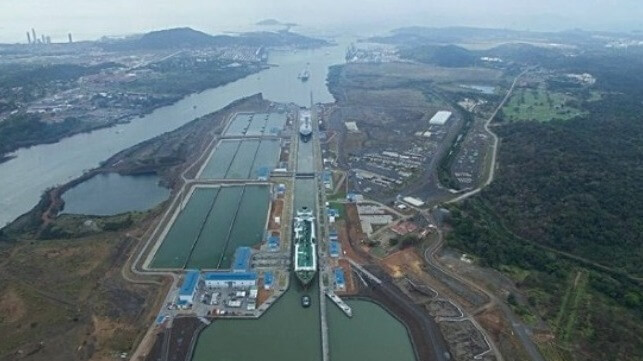Stolt and United Heavy Lift Confirm Diversion Plans Avoiding Panama Canal

Carriers have begun to confirm what analysts were suspecting that ships are now being rerouted to avoid the Panama Canal. With the Panama Canal Authority beginning a phased reduction in daily transits at both the larger and historic sets of locks, carriers are confirming that they are making new plans warning shippers of increased transit times and higher costs.
“Our vessel type and size will not be able to transit the canal in the foreseeable future,” writes Lars Bonnesen, Managing Director of United Heavy Lift in an advisory to clients issued today from Hamburg. “Based on current information from the canal authorities, we estimate that the earliest our vessel type and size will be able to transit the canal will be May-June 2024.”
Bonnesen warns that this means “a huge impact on shipping in general.” United Heavy Lift which is a large provider of ocean transportation services for heavy lift, breakbulk, and project cargoes, expects much longer voyages. They warn ships will be diverting to either the Cape of Good Hope, the Suez Canal, or Cape Horn, causing freight rates to increase.
United Heavy Lift is not alone in diverting ships away from the Panama Canal. Bloomberg reported earlier in November that a chemical tanker, High Loyalty (49,990 dwt), chartered by Glencore’s ST Shipping was traveling from Peru to New York by transiting the Strait of Magellan at the southern tip of South America. The vessel’s last AIS signal from earlier in the week shows her traveling along the coast of Argentina passing Buenos Aires more than 20 days after she departed Peru and with more than two weeks left before she reaches New York.
Stolt Tankers, the world’s largest operator of chemical tankers has also confirmed in an email to Bloomberg that it will be diverting its ship. The company wrote saying the service at the Panama Canal “has become increasingly unreliable,” and to reassure customers, “we have been rerouting our ships via the Suez Canal.”
The Panama Canal Authority in its update admitted that the dry bulk and LNG segments have been the most affected by limited transits. While they are working to maintain the current draft levels, they are reducing daily transits by nearly half to 18 in 2024 and have said they do not expect the situation will improve for many months.
Container carriers so far have been less impacted although some of the largest ships have been forced to transship boxes across the isthmus by train to reduce their draft. Linerlytica is warning in its recent update that the situation for containerships however will get worse as the number of slots at the Neopanamx locks is cut to five a day as of February.
MSC in a customer advisory dated November 27 warned that the restrictions at the Panama Canal, combined with the increase of the canal tariff implemented earlier this year, “are having a direct impact on overall MSC operations costs.” As a result, they became the latest carrier to implement a surcharge announcing starting December 15 they will be imposing a whopping $297 per container Panama Canal Surcharge for boxes transiting the Panama Canal from Asia to the Caribbean.
Operators are now facing the choice of waiting in increasingly long lines if they do not have reservations, competing for space in the daily auctions with the increasing prices, or diverting. Bloomberg reported so far in 2023 carriers have paid $235 million in auction fees to purchase slots, which according to shipping agency Waypoint Port Services is 20 percent higher than in 2022.

that matters most
Get the latest maritime news delivered to your inbox daily.
Wayport expects the delays will continue to grow. In its forecast issued November 27, the agency projects the waiting time will be in seven days at 24 to 26 days for the larger vessels including Handys, Supras, Ultras, Panamax, and Kamsarmax. Regular size vessels (beam less than 91 feet) and Neopanamax vessels fare only slightly better with waits between 14 and 17 days in Wayport’s forecast.
The Panama Canal Authority is urging more vessels to use its reservation system. In the canal’s latest update, they warned that vessels without reservations “may experience indefinite delays.”
